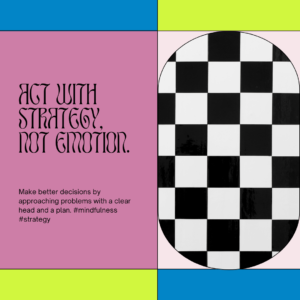In the fast-paced world we live in, it’s easy to let our emotions dictate our actions.
We’ve all been there – a frustrating encounter at work, a heated argument with a loved one, or even just a bad day can lead us to make impulsive decisions that we later regret.
But what if I told you that there’s a better way to navigate through life?
By acting with strategy instead of giving in to our emotions, we can make better choices, reduce stress, and ultimately, just enjoy life more.
-
- The Power of Emotional Decision-Making
Emotions are a fundamental part of the human experience, and they serve as valuable indicators of our feelings and reactions to different situations.
However, when it comes to making important life decisions, allowing our emotions to take the driver’s seat can often lead to undesirable consequences.
Think about the last time you made an emotional decision.
Maybe it was a spur-of-the-moment purchase you couldn’t afford, a harsh response in the heat of an argument, or procrastinating on an important task because you “didn’t feel like it.”
These actions are often driven by immediate emotional satisfaction but can have long-term negative effects.
-
- The Downside of Emotional Decision-Making
- Regret: Emotional decisions can lead to remorse and regret when we realise that our actions were impulsive and irrational.
- Stress and Anxiety: Acting on emotions can lead to increased stress and anxiety as we deal with the consequences of our choices.
- Ineffectiveness: Emotional reactions are often not the most effective way to solve problems or reach our goals.
-
- The Art of Strategic Decision-Making
Acting with strategy means taking a step back, analysing the situation, and making a decision based on reason and long-term objectives rather than immediate emotional impulses.
Here’s how you can start incorporating strategic thinking into your decision-making process:
1. Pause and Reflect
When faced with a decision, take a moment to pause and reflect. This can help you distance yourself from the immediate emotional response and gain a more objective perspective.
2. Set Clear Goals
Define your long-term goals and priorities. Knowing what you want to achieve can help you make decisions that align with your aspirations.
3. Consider Pros and Cons
List the potential advantages and disadvantages of each choice. This analytical approach can guide you toward a more rational decision.
4. Seek Advice
Don’t be afraid to ask for advice from trusted friends, family, or mentors. Other perspectives can provide valuable insights.
5. Sleep on It
For important decisions, give yourself time to think. A good night’s sleep can bring clarity and perspective.
-
- The Benefits of Strategic Decision-Making
- Confidence: Making decisions based on reason and strategy instils confidence in your choices.
- Improved Outcomes: Strategic decisions are more likely to lead to positive outcomes and long-term success.
- Reduced Stress: Strategic thinking can lower stress levels, as you’ll be better equipped to handle challenges.
- Personal Growth: Practicing strategic decision-making can lead to personal growth and increased self-control.
Incorporating a strategic approach to decision-making doesn’t mean eliminating emotions from your life entirely.
Emotions are a natural and important part of who we are, but by learning to manage them and make choices based on strategy, you can lead a more fulfilling and enjoyable life.
So the next time you’re faced with a decision, take a deep breath, consider your long-term goals, and make a choice that will benefit you in the future.
By doing so, you’ll be better equipped to navigate life’s challenges and truly savour the moments that matter most.
Enjoy life by acting with strategy, not just following your emotions!

Share with us below a how you manage to prioritise strategy over your emotions.

